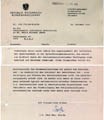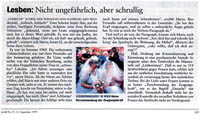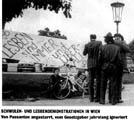Leopoldine B.
"However unfortunate the fate of the person affected..."
There is no trace of Leopoldine B. after her arrest. There is a possibility that she was deported to a concentration camp. On record we have only the review of her case in view of possibly sending her to a concentration camp. The National Socialists destroyed many documents, thus making a final clarification impossible. After the war, Leopoldine B. married again. Many lesbian women of her time lived in heterosexual relationships. Firstly, the nuclear family was portrayed as the centre of the life of every woman, and in addition, many women were financially dependant on men. There were hardly any bars or meeting places for lesbian women. This made acquaintances difficult, and often led to isolation. Only the second women's movement in the 1970s questioned the role of women in society. New freedoms were created, which also enabled the emancipation of lesbian women. Leopoldine B. died in 1967 and did not live to see this period.
Criminalisation of lesbian sexuality after 1945
In June 1945, the criminal code that had been valid before the "Anschluss" (euphemism for the National Socialist takeover in Austria), once again came into force to its full extent. Paragraph 129lb was kept in its original form. The legality of the criminal persecution of gay and lesbian people was not questioned. The reform which de-criminalized sexual relations between adults of the same sex was made as late as 1973. The prohibition to form associations and a higher age of consent than for heterosexuals were kept in force. In the "Opferfürsorgegesetz" (the law regulating aid for victims of the National Socialist regime), lesbian and gay people are still not recognized as victims of National Socialism. This also means that there are no grounds for a guaranteed claim to compensation payments.
Addendum 2009:
The ban on forming associations and a higher age of consent were in force until 1997 and 2002 respectively. Only in 2005 all sentences based on „typically National Socialist injustices" were rescinded, and „sexual orientation" was included into the victim's welfare law as a base of entitlement. However, the general national insurance act (Allgemeines Sozialversicherungsgesetz ASVG) still does not take time served in prison or concentration camps by individuals who were persecuted because of their same-sex lifestyle into account for calculating pensions.






